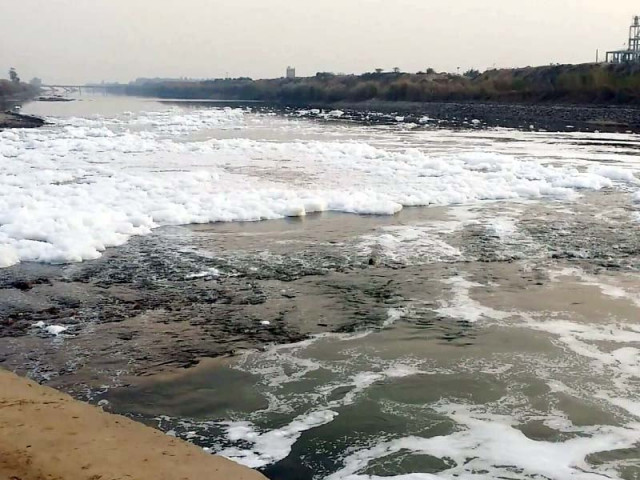Give a hoot, don’t pollute: Industrial waste in Sheikhupura canal endangers human, aquatic life
High metallic content and arsenic have been found in pumped groundwater.

Water in a canal covered with toxic white foam due to industrial waste. PHOTO: EXPRESS
Sheikhupura is considered the second biggest industrial city of Punjab. It consists of hundreds of factories that are creating both environmental and water pollution. These industries include textile, chemical, food processing, pulp and paper, poultry, dairy, plastic, paint, pesticides, leather, tanneries and pharmaceuticals.
Residents of Bhakki, one of the most populated areas of the city, are facing a dilemma. The canal water, which is supplied to homes, is infected with industrial waste and toxins. Presence of toxic heavy metals in irrigation and canal water is causing serious damage to animal life in surrounding areas. Besides, use of contaminated water for agricultural purposes and its consumption is causing people to get waterborne diseases that is putting huge burden on healthcare infrastructure.
The entire municipal waste from the city is collected through a network of drains and discharged into the rivers and canals without any treatment, increasing pollution level with every passing day.
According to various studies, high metal contents and arsenic level has been found in the pumped groundwater that coupled with contamination of sewerage has put the health of the masses at a greater risk of getting diseases.
As per a study recently carried out by WWF-Pakistan, the concentration of arsenic is much higher than the WHO standards at shallow water table depths of up to 30 metre. The main anthropogenic source of arsenic is air pollutants derived from factories and fertilisers.
A report released by WHO stated 25% to 30% of patients are admitted in hospitals due to water borne bacterial and parasitic conditions. Similarly, at least 60% of infant deaths are caused by water infections. Untreated and highly toxic industrial sewage is also used for irrigation near major cities. This can contaminate crops and consequently affect consumers.
Additional input by Fahad Zulfikar
Published in The Express Tribune, March 18th, 2017.



















COMMENTS
Comments are moderated and generally will be posted if they are on-topic and not abusive.
For more information, please see our Comments FAQ